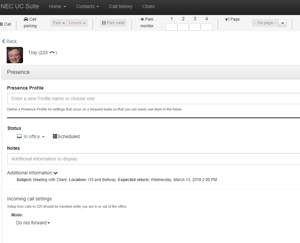
As discussed in the first post of this series highlighting Unified Communications (UC), the role of UC is to bring the mobile work force closer by providing quicker and more efficient interaction with customers and co-workers. One important component of UC is Presence. Presence is an application that provides a bird’s eye view of the whereabouts of colleagues – providing real-time information on staff availability, regardless of location. Are they in a meeting, on vacation, on sick leave? Presence makes it possible to find and contact an available co-worker wherever they might be, enabling as close to a "real-time" response to customers as possible .
Think of Presence as a sophisticated In/Out board. Presence indicates if a co-worker is at their desk, busy, away from the office and many times can identify their precise geographic location. An  obvious benefit is the time saved by not calling a person who is away or busy. Presence may include information about how long the person will be away from their desk and leave instructions for how to contact them. It may also offer information about an expected call and how the call should be handled.
obvious benefit is the time saved by not calling a person who is away or busy. Presence may include information about how long the person will be away from their desk and leave instructions for how to contact them. It may also offer information about an expected call and how the call should be handled.
UC/Presence technology integrates many of the media we use on a regular basis. For example, a Presence status showing online or busy might include the option to send a quick message via text or chat that can be answered without disrupting ongoing work. The messages and responses can even be downloaded and archived for future retrieval.
Presence can also be used to organize an impromptu conference call with colleagues in other offices as one can quickly determine who is available and who is not. With only a simple click on a co-worker's icon, a conference call can be easily established. When traveling, Presence can be used on a mobile device to see who is at their desk before calling the office. It can also see if callers are online and available for an instant message.
Benefits:
- Creates real-time communications
- Improves responsiveness by making first-call resolution a reality
- Reduces frustrations of delayed communications and wasted time
- Eliminates voice mail "jail"
- Improves efficiency and productivity
Customer Service
It can be frustrating for customers when they try to contact someone and are told to leave a message or are informed someone will be in touch shortly. It’s also frustrating and costly for organizations when neither internal nor external calls are being handled immediately. An organization’s ability to quickly link a customer to the right person to close a sale or resolve an inquiry can make all the difference between a satisfied customer and an unhappy one. With Presence, customer calls can be re-directed to the right people, whether they are at their desk or outside the office using an App on a mobile device.
In the End
Presence is an important tool in the expanding tool box of Unified Communications . Knowing the real-time location and availability of colleagues improves the efficiency of company operations and integrating current technologies such as SMS, Text, Chat and Conferencing offers another layer of efficiency. These improvements trickle down to the customer level by providing quicker and easier access to the person or department best aligned to meet customer needs. Improving interoffice communications and improving customer service makes Presence a winning communication technology solution.



 Unetek
Unetek 